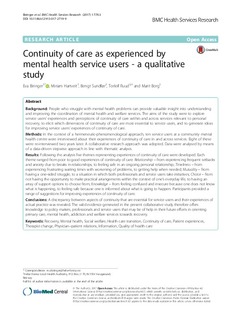| dc.contributor.author | Biringer, Eva Aaker | |
| dc.contributor.author | Hartveit, Miriam | |
| dc.contributor.author | Sundfør, Bengt | |
| dc.contributor.author | Ruud, Torleif | |
| dc.contributor.author | Borg, Marit | |
| dc.date.accessioned | 2018-02-14T13:03:39Z | |
| dc.date.available | 2018-02-14T13:03:39Z | |
| dc.date.created | 2017-12-15T14:23:20Z | |
| dc.date.issued | 2017 | |
| dc.identifier.citation | Biringer et al. BMC Health Services Research (2017) 17:763 DOI 10.1186/s12913-017-2719-9 | nb_NO |
| dc.identifier.issn | 1472-6963 | |
| dc.identifier.uri | http://hdl.handle.net/11250/2484702 | |
| dc.description.abstract | Background: People who struggle with mental health problems can provide valuable insight into understanding and improving the coordination of mental health and welfare services. The aims of the study were to explore service users’ experiences and perceptions of continuity of care within and across services relevant to personal recovery, to elicit which dimensions of continuity of care are most essential to service users, and to generate ideas for improving service users’ experiences of continuity of care. Methods: In the context of a hermeneutic-phenomenological approach, ten service users at a community mental health centre were interviewed about their experiences of continuity of care in and across services. Eight of these were re-interviewed two years later. A collaborative research approach was adopted. Data were analysed by means of a data-driven stepwise approach in line with thematic analysis. Results: Following the analysis five themes representing experiences of continuity of care were developed. Each theme ranged from poor to good experiences of continuity of care: Relationship – from experiencing frequent setbacks and anxiety due to breaks in relationships, to feeling safe in an ongoing personal relationship; Timeliness – from experiencing frustrating waiting times with worsening of problems, to getting help when needed; Mutuality – from having a one-sided struggle, to a situation in which both professionals and service users take initiatives; Choice – from not having the opportunity to make practical arrangements within the context of one’s everyday life, to having an array of support options to choose from; Knowledge – from feeling confused and insecure because one does not know what is happening, to feeling safe because one is informed about what is going to happen. Participants provided a range of suggestions for improving experiences of continuity of care. Conclusions: A discrepancy between aspects of continuity that are essential for service users and their experiences of actual practice was revealed. The valid evidence generated in the present collaborative study therefore offers knowledge to policy makers, professionals and service users that may be of help in their future efforts in orienting primary care, mental health, addiction and welfare services towards recovery. | nb_NO |
| dc.language.iso | eng | nb_NO |
| dc.rights | Navngivelse 4.0 Internasjonal | * |
| dc.rights.uri | http://creativecommons.org/licenses/by/4.0/deed.no | * |
| dc.title | Continuity of care as experienced by mental health service users - A qualitative study | nb_NO |
| dc.type | Journal article | nb_NO |
| dc.type | Peer reviewed | nb_NO |
| dc.description.version | publishedVersion | nb_NO |
| dc.rights.holder | The Author(s). 2017 | nb_NO |
| dc.source.volume | 17 | nb_NO |
| dc.source.journal | BMC Health Services Research | nb_NO |
| dc.source.issue | 1 | nb_NO |
| dc.identifier.doi | 10.1186/s12913-017-2719-9 | |
| dc.identifier.cristin | 1528113 | |
| cristin.unitcode | 222,0,0,0 | |
| cristin.unitname | Høgskolen i Sørøst-Norge | |
| cristin.ispublished | true | |
| cristin.fulltext | original | |
| cristin.qualitycode | 2 | |

